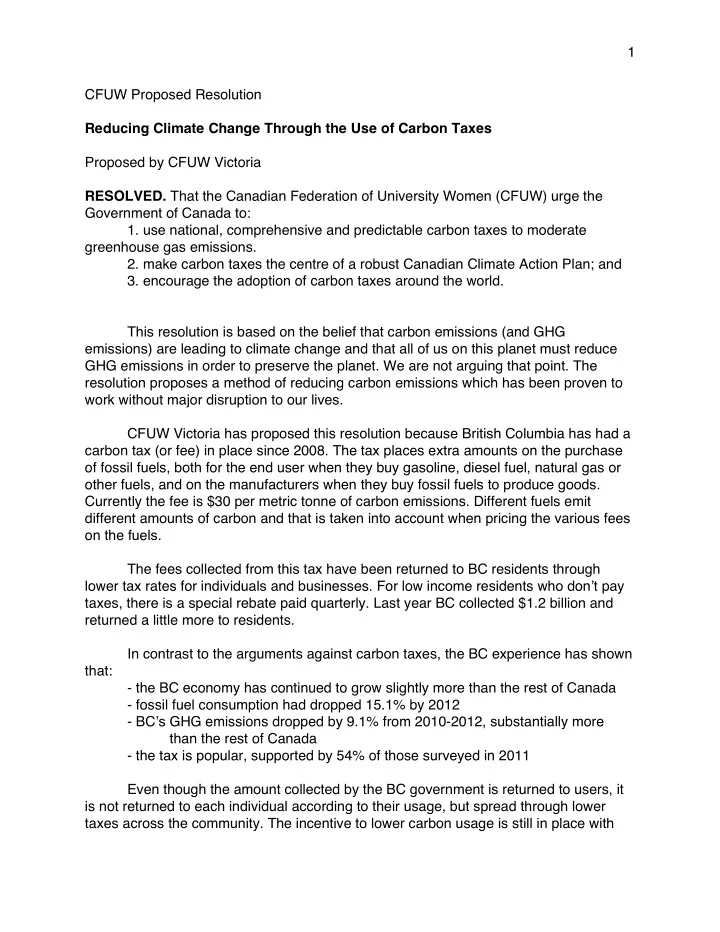

1 CFUW Proposed Resolution Reducing Climate Change Through the Use of Carbon Taxes Proposed by CFUW Victoria RESOLVED. That the Canadian Federation of University Women (CFUW) urge the Government of Canada to: 1. use national, comprehensive and predictable carbon taxes to moderate greenhouse gas emissions. 2. make carbon taxes the centre of a robust Canadian Climate Action Plan; and 3. encourage the adoption of carbon taxes around the world. This resolution is based on the belief that carbon emissions (and GHG emissions) are leading to climate change and that all of us on this planet must reduce GHG emissions in order to preserve the planet. We are not arguing that point. The resolution proposes a method of reducing carbon emissions which has been proven to work without major disruption to our lives. CFUW Victoria has proposed this resolution because British Columbia has had a carbon tax (or fee) in place since 2008. The tax places extra amounts on the purchase of fossil fuels, both for the end user when they buy gasoline, diesel fuel, natural gas or other fuels, and on the manufacturers when they buy fossil fuels to produce goods. Currently the fee is $30 per metric tonne of carbon emissions. Different fuels emit different amounts of carbon and that is taken into account when pricing the various fees on the fuels. The fees collected from this tax have been returned to BC residents through lower tax rates for individuals and businesses. For low income residents who don’t pay taxes, there is a special rebate paid quarterly. Last year BC collected $1.2 billion and returned a little more to residents. In contrast to the arguments against carbon taxes, the BC experience has shown that: - the BC economy has continued to grow slightly more than the rest of Canada - fossil fuel consumption had dropped 15.1% by 2012 - BC’s GHG emissions dropped by 9.1% from 2010-2012, substantially more than the rest of Canada - the tax is popular, supported by 54% of those surveyed in 2011 Even though the amount collected by the BC government is returned to users, it is not returned to each individual according to their usage, but spread through lower taxes across the community. The incentive to lower carbon usage is still in place with
2 this method. Users might lower usage through buying more efficient cars, lowering the temperature of houses, walking instead of driving, and many more. Other jurisdictions have also implemented carbon reduction policies..Quebec and California have carbon taxes. Alberta has a cap and trade system. In this system, the government mandates a cap on how much emission is allowed for each industry, and those who emit more may buy credits from those who emit less. Cap and trade was used since 1980 to lower the emissions that caused acid rain and was successful. Sweden has used carbon taxes since 1991. Their current tax is $140/tonne (BC’s tax is $30 per tonne) and Sweden has estimated it has reduced emissions by 20%, allowing Sweden to meet its 2012 target under the 1992 Kyoto Protocol. Since 1991 Sweden has increased its economy by 100% and has also developed a green energy industry. A carbon tax on the BC model, gradual introduction, returning revenues to taxpayers, comprehensive and predictable rates, is what this resolution recommends. The CFUW-Ottawa Ad-Hoc policy review committee recommends voting in favour of this resolution as submitted. ADDITIONAL INFORMATION The Government of Canada, under the Copenhagen Accord (2009) has committed to reduce GHG emissions by 17% from 2005 levels by 2020. Yet it has no comprehensive plan to achieve this target. The prices we pay for fuel do not reflect the damage we are doing to the environment. The UN International panel on climate change (IPCC ) Fifth Assessment Report published in November, 2014, stated that in order to keep global temperatures from rising more than 2°C from 2010 levels, we need to reduce GHG emissions by 40-70% by 2050 and to near zero by 2100. IPCC: The risks associated with temperatures at or above 4°C include substantial species extinction, global and regional food insecurity, consequential constraints on common human activities, and limited potential for adaptation in some cases (high confidence). The Pembina Institute and the David Suzuki Foundation: The science indicates that to avoid exceeding the 2°C limit, industrialized countries need to reduce their combined
3 emissions of greenhouse gases (GHGs) to 25 to 40 per cent below the 1990 level by 2020. BC: The rate for gasoline is 6.67 cents per litre. The tax rate for diesel is slightly higher at 7.67 cents per litre due to the higher carbon content of the fuel, while the tax on propane is lower on a per litre basis. The BC carbon tax alone could cause a reduction in B.C.’s emissions in 2020 by up to three million tonnes of CO2 equivalent annually. This is roughly the equivalent to the greenhouse gas emissions created by 787,000 cars per year. BC: The carbon tax applies to virtually all emissions from burning fuels, which accounts for an estimated 70 per cent of total emissions in British Columbia. Of the approximately 30 per cent of emissions that are not from fuels: • 10 per cent are from non-energy agricultural uses (e.g. emissions from enteric fermentation, manure management, and agricultural soils) and waste (landfills); • 10 per cent are from fugitive emissions which cannot currently be accurately measured; • 6 per cent are non-combustion industrial process emissions; and • 5 per cent are from net deforestation.
Recommend
More recommend